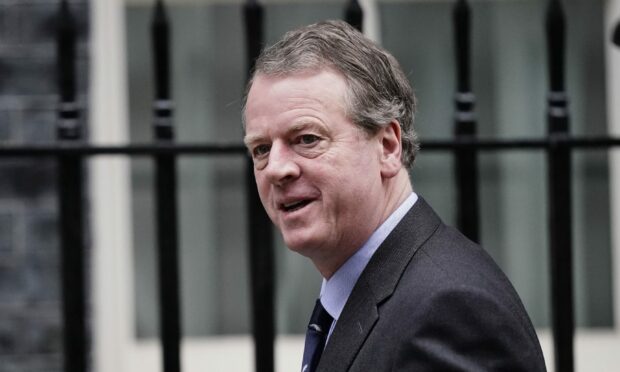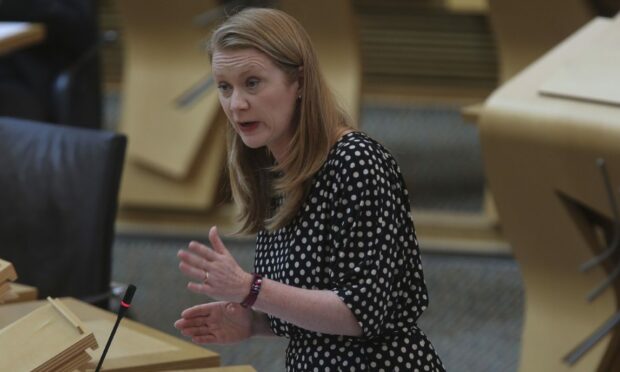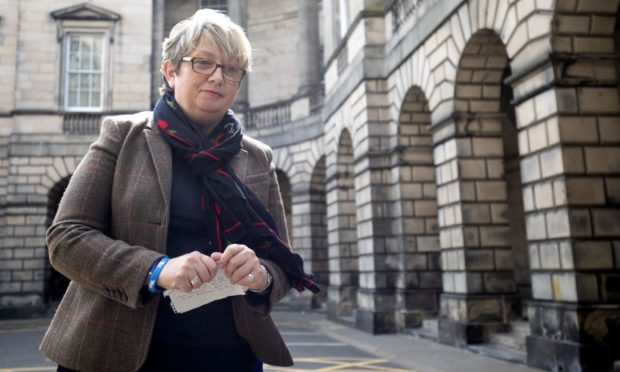
A top public law expert says the Scottish Government’s legal challenge against the UK Government’s section 35 order is not as weak as some suggest – but is unlikely to win in court.
Last week new First Minister Humza Yousaf announced his SNP government would be challenging Scottish Secretary Alister Jack’s decision to block its gender reforms from becoming law.
Dr Sean Whittaker, who teaches public law at Dundee University, says the UK Government is in a much stronger legal position than the SNP.
This comes after some within the SNP criticised Mr Yousaf’s decision to hold a legal challenge, saying it is “deeply unpopular” and “unlikely to win”.
Why has a legal challenge been launched?
Back in December a majority of MSPs in Holyrood passed the Gender Recognition Reform (Scotland) Bill, which aimed to make it easier for a trans person to legally change their gender.
However the UK Government used powers under section 35 of the Scotland Act to prevent the bill from becoming law, arguing it impacts on UK-wide equality laws.
SNP ministers say this undermines devolution, and have now launched a legal challenge in the form of a judicial review against this decision.
The case will initially be heard in the Court of Session in Edinburgh, but is expected to end up in the UK Supreme Court for a final decision, with some estimating it could cost the public purse up to £500,000.
Legal opinion on judicial review
Speaking to The Sunday Post, Dr Whittaker said while the Scottish Government’s challenge is legally competent, it will be difficult to win the argument.
He said: “The Scottish Government has a legal right to do so here and will argue the reasons given by the Scottish secretary for this order are unreasonable and shouldn’t have been used in the first place.
“But it could have an effect on the UK-wide Equality Act 2010, which is a reserved matter.”
Scottish Secretary Alister Jack said he brought forward the order because he believed the bill would have an “adverse effect” on matters which are reserved to Westminster.
Mr Jack said: “The use of the power is entirely within the devolution settlement as set out from its inception, with cross party support.”
Dr Whittaker said while their chances are “not zero”, he suspects the UK Government’s argument will be seen as reasonable in court.
He said: “The Scottish Government has a better chance of success than others might imply but overall I do think the proposed bill does impact on the operation of the UK-wide Equality Act and Gender Recognition Act.”
Could a section 35 order have been avoided?
Dr Whittaker added the UK Government could also have raised their concerns with the legality of the Scottish Government bill without raising a section 35 order.
He said: “There was a better way for the UK Government to go about this, by raising concerns throughout the bill’s creation process.
“That is why it is so significant – a section 35 order has never been used before now.
“They could have set out their concerns and had them better reflected by the Scottish Government.”
This is something Social Justice Secretary Shirley-Anne Somerville raised when the SNP announced its legal challenge.
She said: “The UK Government gave no advance warning of their use of the power, and neither did they ask for any amendments to the bill throughout its nine month passage through parliament.
“Our offers to work with the UK Government on potential changes to the bill have been refused outright by the secretary of state, so legal challenge is our only reasonable means of resolving this situation.”
‘Unacceptable’
The Scottish Government’s decision has been welcomed by the Scottish Trans Alliance, who say the bill would have made it “simpler and fairer” for trans people to be who they truly are.
A spokesperson for the group said: “For the UK Government to seek to block the Scottish democratic process in this way, simply because they disagree with the welcome decision the Scottish Parliament has made to improve trans people’s lives, is unacceptable.
“Other countries all over the world have introduced similar laws, with the only impact being a positive one – on the tiny number of trans people who need legal recognition of how we live our lives, as everyone is entitled to under international human rights law.”
‘It’s unlikely to win’
The debate around gender reform and the SNP’s legal challenge has caused a rift amongst the party.
Joanna Cherry KC, MP for Edinburgh South West and an outspoken critic of the proposed bill, said: “I cannot understand why the Scottish Government is taking legal action it’s unlikely to win rather than sorting out the problems with the GRR bill at home.
“Reform could be effected in Scotland without breaking equality or human rights law if there was the will so to do.”
Former first minister hopeful Ash Regan has also voiced her opposition to Mr Yousaf’s decision to launch a legal challenge.
The Edinburgh Eastern MSP vowed to completely drop the bill if she became first minister, and she resigned from her role as community safety minister so she could vote against the government on this matter.
She said: “The decision to challenge the section 35 order will result in a humiliating defeat.
“The GRR is deeply unpopular amongst Scottish voters and court action will cost a vast amount of taxpayers’ money.”
She also suggested the party had lost 30,000 members “over this policy”.
During the SNP leadership campaign the party’s chief executive Peter Murrell and communications chief Murray Foote both resigned after it was revealed they had lied about party membership dropping by 30,000.
However there is no evidence to suggest this drop was solely down to the SNP’s gender reform proposals.
A Survation poll last month suggested 55% of Scots oppose the government’s legal challenge.

Enjoy the convenience of having The Sunday Post delivered as a digital ePaper straight to your smartphone, tablet or computer.
Subscribe for only £5.49 a month and enjoy all the benefits of the printed paper as a digital replica.
Subscribe



